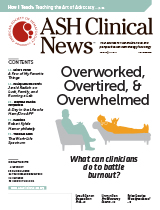Well-Being and Resilience
ASH recognizes that in order to accomplish its mission of helping hematologists conquer blood diseases worldwide it is necessary to have a strong workforce of clinicians, researchers, and other members of the health care team. Well-being is a critical factor in the strength of this workforce, and the Society is committed to helping hematologists address the myriad factors impacting well-being through interventions such as openly addressing burnout in live meetings and in publications, advocating on behalf of hematologists to streamline administrative work, and sharing approaches to building resilience among hematologists.
ASH provides the following resources to help clinicians and trainees be resilient.
ASH Well-Being and Resilience Working Group
The Well-Being and Resilience Working Group is comprised of members of the Committee on Practice, the Committee on Training, the Committee on Education, Trainee Council, and additional ASH members with an interest in physician wellness. The working group will examine what ASH can do to promote further wellness and resilience, and alleviate burnout as it relates to the practice of hematology. The working group recommends and explores actions that ASH can take related to well-being and resilience. If you are interested in being a member, please contact ASH Policy and Practice Manager, Myra Masood at [email protected].
Resilience at ASH Annual Meetings

“Wellness” and “self-care” are massive buzz words it seems, but beyond the trendiness, personal wellness has made its mark on numerous industries, including health care. For the past few years, ASH has made “clinical well-being” an evolving presence at the annual meeting and invited attendees to interact with the concept in myriad ways. New in 2019, and continuing in the spirit of previous years, the ASH Wellness Studio represents ASH’s ongoing effort to address the topic of resilience and clinical well-being through education. Here, attendees may engage in short (10 minute) micro-bursts of education throughout the day on topics related to building healthy habits.
At the 2021 ASH Annual Meeting, the Studio will be centrally located at ASH Central, and attendees are encouraged to visit in between sessions, during lunch breaks, or whenever one’s schedule permits. Check out the schedule in the Annual Meeting App!
During the 2018 ASH Annual Meeting, ASH partnered with the National Academy of Medicine (NAM) to digitally print and display images from NAM’s “Expressions of Clinical Well-Being”. In the fall of 2018, the NAM put out a nationwide call for artists of all skills and abilities to submit artwork that expresses how clinicians, their loved ones, patients, and organizations experience and are affected by clinician burnout and well-being. Artists were asked to answer the question: What does clinician well-being look, feel, and sound like to you? Over 350 people responded. In additional to the pieces displayed at the ASH Annual Meeting, 100 of these pieces are visible through the permanent digital gallery, which aims to promote greater awareness and understanding of barriers to clinician well-being and to highlight potential solutions to protect and promote the well-being of clinicians of all kinds, including doctors, nurses, pharmacists, dentists, and others.
ASH Practice Partnership
The ASH Practice Partnership (APP) is comprised of practicing hematologists across the U.S. who are interested in hematology care issues, quality of care, new health care delivery systems, and practice management issues.
Each year, the APP hosts a lunch at the ASH annual meeting, designed to provide a practice-focused session for this community. In 2017, the APP Lunch focused on physician stress and burnout, with speakers presenting on the following topics: physician well-being as a whole; the focus on compassion to mitigate burnout; and burnout, moral distress, and career satisfaction in hematopoietic cell transplant (HCT) providers. The APP will continue to work on physician stress and burnout in the coming years.
Join the APP or submit a nomination.
National Academy of Medicine Action Collaborative
The National Academy of Medicine (NAM) launched the Action Collaborative on Clinician Well-Being and Resilience, a network of organizations – including ASH – committed to reversing trends in clinician burnout. The Action Collaborative’s three goals include:
- Improving baseline understanding of challenges to clinician well-being,
- Raising the visibility of clinician stress and burnout, and
- Elevating evidence-based, multidisciplinary solutions that will improve patient care by caring for the caregiver.
The NAM also recently introduced its Clinician Well-Being Knowledge Hub, a dynamic and comprehensive resource repository that includes peer-reviewed research, news articles, blog posts, toolkits, reports, and briefs on clinician well-being and burnout. The knowledge hub provides a central source for health system leaders, clinicians, and trainees to better understand what causes clinician burnout and to adopt solutions that promise a brighter, healthier future.
Join the NAM listserv to keep up to date on the Action Collaborative and the organization’s other clinician well-being and resilience initiatives.
ASH Publications

Read the following articles on physician burnout in ASH Clinical News:
- "Burnout? What Burnout?"
This June 2018 article chronicles Dr. Keith Stewart’s experience with burnout as it relates to clinical trials. - “No Easy Solution for Physician Burnout”
Physician burnout is marked by emotional exhaustion, cynicism, and decreased effectiveness; and it is on the rise in the U.S., with up to 54 percent of doctors affected. In this article, Tait Shanafelt, MD, and Christine Sinsky, MD, provide thoughts on the subject. - “Beating Burnout: When Clinicians are Overworked, Overtired, and Overwhelmed”
This September 2015 article covers some of the most common complaints among practicing hematologists, whether career stage plays a role in burnout, and steps institutions can take to help battle burnout.
Read the following articles on physician burnout in TraineE-News:
- “Coming Back to the Bench”
Andrew Volk, PhD, writes about the impact trainee mental health has on personal and institutional success. - “Stress and Resiliency: How to Fight Burnout”
Members of the Trainee Council share some thoughts on stress and resiliency in an effort to address the issue of burnout among physicians, specifically trainees. - “Ask for help: fighting Depression and Burnout in the Trainee Community”
Dr. Arun Singavi, MD, from the Medical College of Wisconsin, discusses the importance of self-care for those in the medical field.
Additional Resources
Moving Medicine
In the Summer 2019 edition of the American Medical Association’s Magazine, Moving Medicine, the issue takes a look at changing the culture of burnout. Physician burnout continues to be a major issue and the AMA has been one of many organizations to cast a spotlight on burnout and is working to address it. As AMA President, Dr. Patrice Harris notes, “We have seen a reduction in burnout rates among physicians for the first time in three years, but there is still much work to be done.” This Moving Medicine issue explores the many sides of professional burnout – from organization transformation and ongoing research on solutions to the impact of burnout on personal relations.
Agency for Healthcare Research and Quality
A new Agency for Healthcare Research and Quality (AHRQ) primer looks at the impact of healthcare provider burnout on the delivery of safe and high-quality care and ways the issue is being addressed from a systems perspective. AHRQ has funded research on burnout for 15 years and continues to address the issue as co-leader of the National Steering Committee for Patient Safety along with the Institute for Healthcare Improvement. Access the new primer from AHRQ’s Patient Safety Network (PSNet).
Association of American Medical Colleges
The Association of American Medical Colleges (AAMC) released a report, The Rise of Wellness Initiatives in Health Care: Using National Survey Data to Support Effective Well-Being Champions and Wellness Programs. The report is a product of the AAMC’s Council on Faculty and Academic Societies (CFAS) Faculty Resilience Committee and presents findings from two surveys that examined common characteristics of wellness programs and the roles and responsibilities of the health care professionals who lead wellness efforts. The report also presents 10 recommendations for how medical schools and teaching hospitals can promote a culture of well-being and develop and support wellness leaders and initiatives.
Sign Up for ASH Newsletters
Stay up to date on all of ASH's resilience efforts. Sign up for one of the Society's newsletters, Practice Update or Hematopoiesis!